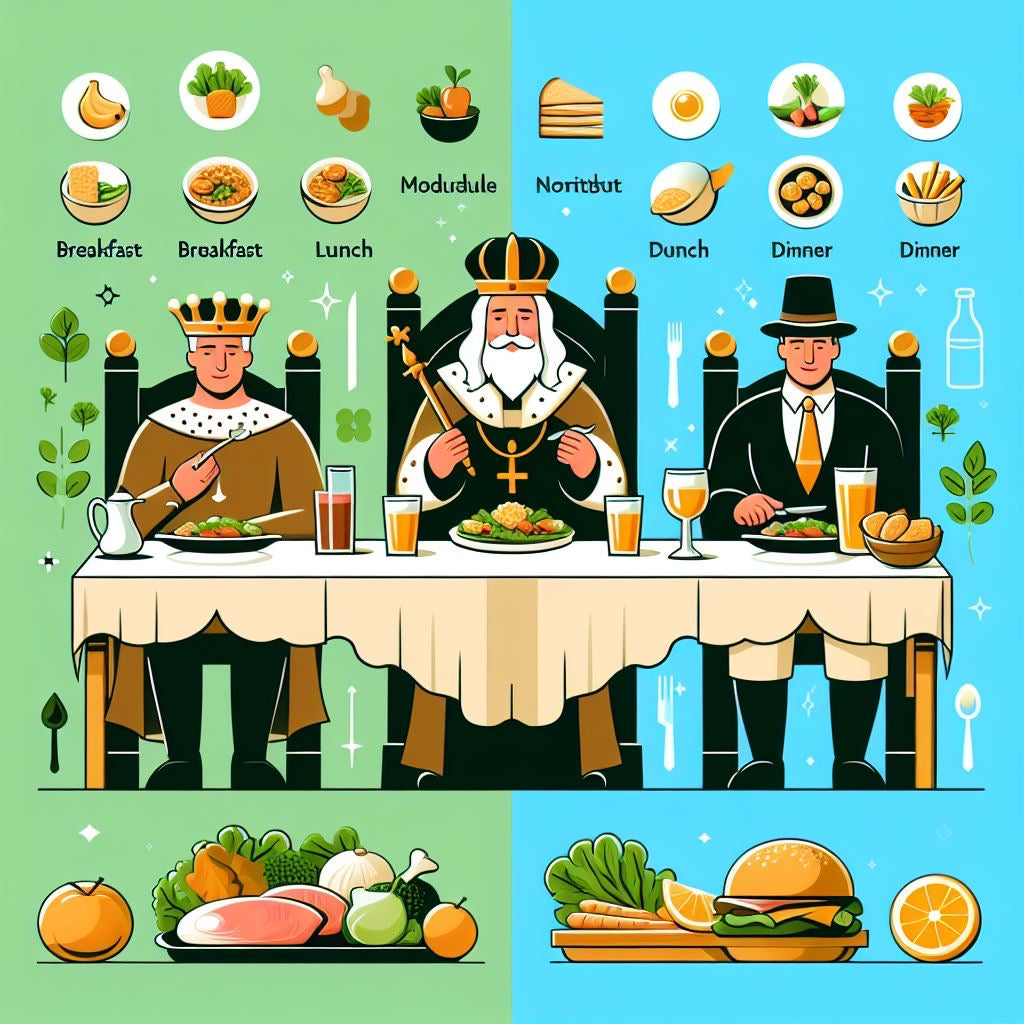
The King and Peasant Strategy: A Smart Approach to Bariatric Dieting
Share
Does this sound familiar? You wake up in a rush, barely grabbing a quick bite—or skipping breakfast altogether—before heading out the door. At work, you're too busy to take a proper lunch break, so you eat something small and get back to your tasks. By the time you get home, you’re starving, so you eat a large meal and snack until bedtime. Unfortunately, this common routine is a perfect recipe for weight gain.
In today’s fast-paced society, we often place too much emphasis on our evening meals and neglect our morning nutrition. This trend needs reversing, especially for bariatric patients and those seeking to lose weight. That’s where The King and Peasant Strategy comes in—a simple yet effective method to balance your calorie intake throughout the day for optimal weight loss. The concept is to eat like a king in the morning, like a noble in the middle of the day, and like a peasant in the evening.
Break Your Fast Like a King
Imagine starting your day like a king sitting at a table loaded with nutritious food. That’s how we want you to think about breakfast. There’s a reason it’s called the most important meal of the day—it not only boosts mood, energy, and concentration, but it also plays a vital role in weight management.
When we sleep, our metabolism slows down significantly. According to a 2009 study published in Metabolism, our metabolic rate can drop by as much as 35% during sleep. This conservation of energy is why consuming a large, nutrient-dense breakfast is essential—it jumpstarts your metabolism for the day ahead. Without breakfast, your metabolism will remain sluggish, leading to potential weight gain. A hearty breakfast also curbs cravings for sweets and junk food later in the day, reducing the likelihood of overeating in the evening. Just remember, this isn’t a green light for sugary cereals or donuts. Opt for high-quality, nutritious foods that fuel your body properly (Harvard Health).
Nibble Like a Noble
Nobles, or the middle class, didn’t starve, but they also didn’t overindulge like a king. The same should go for your lunch. A solid midday meal is necessary to keep your metabolism running and to avoid overeating later in the evening. If you’ve had a substantial breakfast, you likely won’t feel too hungry, so a balanced meal with some healthy snacks is sufficient to maintain your energy levels.
Snacking on healthy options such as vegetables, fruits, and nuts throughout the day will keep your metabolism active and help burn fat. The goal is to keep yourself satisfied, not stuffed, and avoid those afternoon energy crashes that can lead to unhealthy snacking (WebMD).
End of Day Peasantry
At night, your body’s metabolic rate slows significantly as you prepare for sleep. Eating a large dinner and snacking late at night will result in the energy from those meals being stored as fat because it isn’t burned off like it is during the day. This is why it’s important to eat like a peasant in the evening—keep dinner light, nutritious, and modest in portion size.
This doesn't mean you should skip dinner altogether or go hungry—just be mindful that your body doesn’t need as much fuel in the evening, and any excess calories will likely turn into stored fat. By keeping your dinner portions small and healthy, you help ensure that your body is digesting efficiently and preparing for restful sleep rather than storing excess calories as fat (Mayo Clinic).
Balanced Nutrition for Weight Loss
Following the King and Peasant Strategy is not just about meal sizes; it’s also about meal quality. Focusing on nutrient-dense foods, along with the proper supplementation and exercise routine, will help bariatric patients and individuals seeking weight loss achieve their goals faster and in a sustainable way.
Future blogs will dive into excellent breakfast, lunch, dinner, and snack options that align with this strategy. In the meantime, remember that good habits start with awareness and consistency. By shifting your caloric intake to better match your body’s natural metabolic rhythm, you can start losing weight smarter—not harder!
